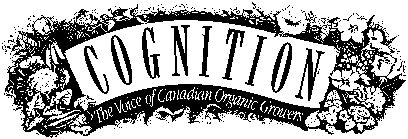

Cognition Index | Virtual Library
| Magazine Rack
Search
| Join the Ecological Solutions Roundtable
GOAT KEEPING
by Marti Matin-Wood
As organic growers, we are always thinking of ways to improve the structure and fertility of our soil. At the same time, we need to be concerned about the "cleanliness" of compost ingredients. The ideal is to have a closed circle of production within our farms.;
Here at Two Wings Farm, we are trying to get closer to this ideal by using goat manure and bedding as a main compost ingredient. We have a small herd (under a dozen) of registered Alpine dairy goats.
Why goats? Manure that is easily managed is just one of the many gifts provided by these wonderful creatures. Fresh milk, cheeses, yogurt, meat, skins, and fiber produced at home without the antibiotics, hormones, and dyes sometimes present in the commercial stuff are a few other benefits. Goats are easy to care for: chores take only about 20 minutes morning and evening. These very hardy animals give birth with ease, usually have multiple births and have very few health problems. They can be kept on a small acreage and they are economical: you can keep six to eight goats for the same amount of feed it takes to keep one cow, and you’ll get twice the milk. Goats are delightful, funny, smart, affectionate and clean. They will accept you as a herd member when humans won’t, and in this plastic and artificial world, there are few things as real, exciting and joyful as seeing your favorite doe give birth to her kids.
The cons? Goats will eat your garden and, given half a chance, will bark your fruit trees and eat your neighbor’s roses, so good fences are a must. You will have to be dedicated, especially if you are milking: usually, it’s required every 12 hours although it’s possible to milk only once a day. However, there’s always the possibility of trading off with other goat keepers.
You will need a shelter for your goats, in the form of a shed, stable or barn. Recommendations range from 12 to 20 square feet per animal. I would suggest taking a look at the setup of a few goatkeepers and asking them what they would do differently to improve things. Goats are herd animals so you’ll need to get more than one. They don’t do well as single animals. You’ll also need a dry place to keep hay. They eat from three to ten pounds a day, depending on a number of factors. A rodent-proof place for grain is also essential.
The thing I would most strongly recommend to anyone looking into goats is to get in touch with your local goat breeders’ association and just hang around, go to meetings, get an education. I’ve met terrific people who were always willing to advise me and pitch in when I needed help.
There are six breeds of dairy goats in the Canadian livestock registry. The first four are Swiss breeds. Alpine, imported from the Alps in 1920, are large, beautiful, gentle, intelligent, excellent milk providers with feminine lines. Saanan, always white, are noted for excellent milk production. Toggenburg are always brown with white face markings. Oberhasli, a beautiful bay brown with black markings, are the oldest and rarest of the Swiss breeds. Nubian, developed in England of Egyptian and Indian ancestry and characterized by Roman noses and pendulous ears, are excellent milk producers though they are sometimes noisy. Docile La Mancha, genetically earless ("gopher-eared") and developed in Texas, are good milk producers. In addition to these dairy breeds, Angora and Cashmere are used for mohair fibers, and Boer, from South Africa and New Zealand, are for meat production. It is important to keep the breeds going for genetic diversity. Just as we need to maintain pure varieties of tomatoes, we need also to maintain pure breeds of animals or they will be lost in a "homogenization" effect. So buy pure breeds from the breeder if you can, and don’t cross. Too many people are producing inferior animals with poor characteristics, and this serves to devalue goats in general. A breeder will guarantee health, and you will receive registration papers from the Canadian Livestock Records Corp.
At the present time, it is illegal for a goatkeeper to sell, give away or even transport goat’s milk that is not from a certified grade A dairy. I feel that this is outrageous and discriminatory to the small holder.
Last year, in British Columbia, there was a 124% increase in small holdings and an 8% decrease in large operations. I suspect other provinces show a similar trend. Those of us with small farms must be released from the straitjacket of legislation that favors the large stakeholders in agriculture. We need to have access to our market.
Marti Martin-Wood lives with her husband and two children at Two Wings Farm, a small organic holding on Vancouver Island. They produce a wide variety of tree fruits and vegetables which they sell through Victoria’s Moss Street Market, and Marti maintains a large collection of rare tomatoes.
Copyright © 1996.
Marti Matin-WoodReprinted with permission. All rights reserved.
Info Request | Services | Become EAP Member | Site Map
Give us your comments about the EAP site
Ecological Agriculture Projects, McGill University (Macdonald
Campus)
Ste-Anne-de-Bellevue, QC, H9X 3V9 Canada
Telephone:
(514)-398-7771
Fax:
(514)-398-7621
Email: info@eap.mcgill.ca
To report problems or otherwise comment on the structure of this site, send mail to the Webmaster